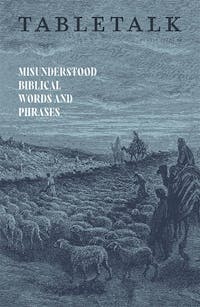
Request your free, three-month trial to Tabletalk magazine. You’ll receive the print issue monthly and gain immediate digital access to decades of archives. This trial is risk-free. No credit card required.
Try Tabletalk NowAlready receive Tabletalk magazine every month?
Verify your email address to gain unlimited access.
The Hebrew word bamah—translated as “high place”—has long puzzled linguists. In other ancient Semitic languages, its cognates refer to the “flanks” or “sides” of an animal, sometimes extended to refer to the open country on the slopes of the hills where battles were fought (see Ps. 18:33–34). Yet the Septuagint—the Greek translation of the Old Testament—sometimes translates bamah with the Greek word for “mountain peaks.” This agrees with verses that describe a bamah as something to which one ascends (1 Sam. 9:13–14, 19) or something associated with the clouds (Isa. 14:14).
So it is no surprise that bamah is translated “high place,” even though most scholars do not believe that the biblical writers had height primarily in view. Archaeologists give the label bamah to any shrine or cult-site found in ancient Israelite cities. One example of this is the small temple that existed inside the Judean fortress of Arad until it was dismantled, likely as part of Hezekiah’s reforms (see 2 Kings 17:9).
What is key is that Israel built shrines, sometimes out in the open (1 Kings 14:23; 2 Kings 16:4) and other times right in their cities and towns (1 Kings 13:32; 2 Kings 23:5; 2 Chron. 28:25). But what was their reason for building these?
Some high places were the result of idolatry and pagan religious practice. Numbers 33:51–52 states that Israel was to destroy various Canaanite religious implements, including high places. Solomon built a high place for the false foreign gods Chemosh and Molech (1 Kings 11:7). And wicked King Manasseh built high places during his despicable idolatry binge (2 Kings 21:1–5). Thus, some high places were the bitter fruits of apostasy.
But other high places were devoted to Yahweh by Israelites seeking to offer acceptable worship. First Samuel 9:11–27 tells of Saul’s first encounter with Samuel. Samuel attended a feast at the high place of the city to bless the sacrifice; presumably it was being offered to the Lord. God was, after all, communicating with Samuel at that very time about Saul, with no hint that this high place was unorthodox (see vv. 15–17). First Kings 3:2 even states that people sacrificed at the high places “because no house had yet been built for the name of the Lord,” although the next verse does depict Solomon’s frequenting of the high places as inconsistent with his love for the Lord. When Hezekiah tore down the high places, the Assyrian envoy tried to leverage that act against him, accusing Hezekiah of tearing down high places devoted to the very God in whom he was placing his trust (2 Kings 18:22; Isa. 36:7).

It is best to interpret these later examples of high places as ones that were tolerated by Yahweh at times even though they were neither His intent for true worship nor ultimately conducive to pure worship. This is why even righteous kings of Judah were critiqued with the expression “Yet the high places were not taken away, and the people still sacrificed and made offerings on the high places” (e.g., 1 Kings 22:43; 2 Kings 12:3; 14:4; 15:4). This is also why Hezekiah’s and Josiah’s reforms, which involved tearing down the high places, were such high-water marks in Israel’s history. After all, Moses had warned Israel that idolatry at the high places would ultimately lead to exile (Lev. 26:30).
The story of high places in Israel reminds us of the importance of worshiping God only as He has directed in His Word. Efforts to go beyond God’s Word in worship do not end well. Efforts to “improve” worship based on our feelings, preferences, pragmatics, precedent, popularity, or good intentions do not end well. The story of the high places teaches us to be content with God’s revealed will for worship, reminding us that He will never fail to meet us in grace and mercy when we worship Him in spirit and in truth (John 4:24).
